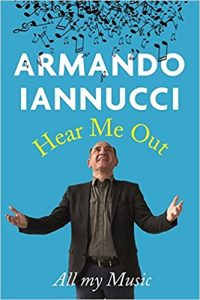 I’ve just finished reading Hear Me Out, a collection of Armando Iannucci’s writings about classical music—a subject about which Iannucci is unashamedly passionate and knowledgeable. From my perspective as an Open University music lecturer, I was delighted to discover just how much of his approach and interests chime with our institutional mission, our activities as a music department, and our new BA degree in particular.
I’ve just finished reading Hear Me Out, a collection of Armando Iannucci’s writings about classical music—a subject about which Iannucci is unashamedly passionate and knowledgeable. From my perspective as an Open University music lecturer, I was delighted to discover just how much of his approach and interests chime with our institutional mission, our activities as a music department, and our new BA degree in particular.
I’ve long been a fan of Iannucci’s comedy writing, but had no idea that he felt so strongly about classical music. Indeed, his listening habits range impressively widely across the centuries from the music of Victoria, Tavener, and Bach to the symphonies of Mahler, Bruckner, Robert Simpson, Malcolm Arnold, and William Alwyn—not forgetting Stravinsky, Berio’s Sequenzas and the music of Ligeti. What comes across most is his voracious appetite to discover more—an attitude that many academics will recognise (even if they acknowledge wistfully that institutional pressures may have dulled their enthusiasm).
Iannucci’s exploration of his own discovery of music, and his attempts to make sense of it as a listener (and latterly as an amateur performer) are compelling and insightful—and often highly amusing. An account of his Grade I piano exam, taken in his early 40s, or his expose of the ridiculous etiquette of modern concert performance, punctures the pomposity associated with classical music, and recognises the barriers that are often erected to prevent people accessing it. And I couldn’t help laughing at his description of Haydn as the “Barbara Cartland of symphonists” (p. 105)!
At many times, too, Iannucci articulates something that resonated with aspects of my teaching. So often, I thought: ‘well, that’s exactly what I’ve tried to say using the literary criticism of Roland Barthes’; or, ‘that’s intertextuality/reception history in a nutshell’! Amongst the comic vignettes are serious questions about art with which musicologists grapple (“Are you meant always to enjoy music?” [p. 38]). But more striking still are those moments when I realised that what the OU offers is just the sort of thing that someone like Iannucci and his readers need.
Iannucci notes the decline of teaching music in schools and states that he “missed out on the opportunity to learn to read music or take up an instrument” (p. 26). Our free OpenLearn course, An introduction to music theory and our Level 2 module A224 Inside music provide just that opportunity to understand notation and to grow in confidence when using it. Iannucci writes compellingly about how learning to read and play music “made it all the more magical” (p. 29) and the Certificate The Practice of Music Making (offered with our partner institution, Trinity Laban Conservatoire) is the perfect way to reflect on one’s own progress as one learns to sing or play a musical instrument with others—whatever one’s level of musical development.
Moreover, when Iannucci writes that music seems “to mean something, say something even. It feels like a language” (p. 2) he could be writing of A342 Central questions in the study of music, which asks of a wide variety of musics ‘what might this mean?’ I also wanted to challenge him to study Beethoven’s Sixth Symphony—explored as a set work in A342—to see whether he’d still find it tedious!
When reading the book—which ends with Iannucci’s libretto to the plastic surgery operetta Skin Deep by David Sawer—I found myself reflecting on the increasing need for university music study in an age that seems to be in some doubt about its place and function. In a piece about discovering Schumann’s music (again, A342 explores the Piano Quintet as a set work), Iannucci notices that “It’s interesting how one grows up with assumptions and unchallenged judgements” (p. 88). This, essentially, is what the Open University’s new music degree (or any other music degree) is for. It challenges those assumptions; makes one question why one values certain kinds of music; and it does so in an open and accessible way.
Armando Iannucci, Hear Me Out: All My Music (London: Little, Brown, 2017): 278pp. ISBN: 9781408709887
